“Global Enterprise Content Management Market to reach a market value of USD 119.29 Billion by 2031 growing at a CAGR of 16.2%”
The Global Enterprise Content Management Market size is expected to reach $119.29 billion by 2031, rising at a market growth of 16.2% CAGR during the forecast period.
ECM systems provide automated workflows for loan processing, risk assessment, and fraud detection, ensuring data accuracy and fast retrieval. By enhancing data security through encryption and audit trails, ECM platforms help banks and financial institutions maintain regulatory compliance and improve customer trust, which is crucial in a highly regulated and data-intensive industry. Therefore, The BFSI segment recorded nearly 1/4th revenue share in the market in 2023. The critical need for secure and efficient management of sensitive financial data, compliance with stringent regulations like GDPR and SOX, and operational streamlining drives the BFSI segment's dominance in the market.
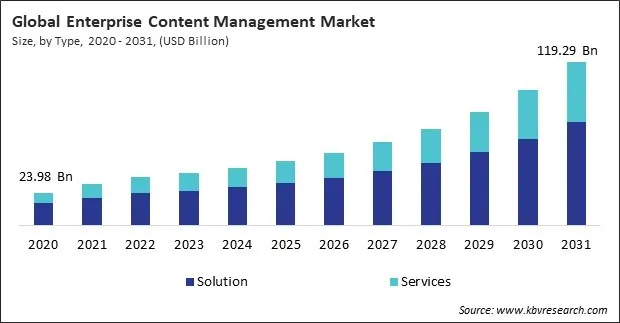
The major strategies followed by the market participants are Acquisitions as the key developmental strategy to keep pace with the changing demands of end users. For instance, In January, 2023, OpenText Corporation completed the acquisition of Micro Focus International plc, a leader in mission-critical software technology. This acquisition expands OpenText’s mission to help organizations accelerate digital transformation by enhancing its portfolio in Cybersecurity, Digital Operations, Applications Modernization, and AI & Analytics. The move aligns with OpenText’s strategy to deliver advanced Information Management solutions and drive growth while reducing costs. Additionally, in January, 2022, Upland Software acquired Objectif Lune, a leader in document composition and business communication automation. This acquisition enhances Upland's ECM capabilities by modernizing complex, paper-based documents and enabling automated delivery across web, email, and mobile platforms, thereby supporting businesses in their digital transformation efforts while maintaining compliance.
Based on the Analysis presented in the KBV Cardinal matrix; Microsoft Corporation is the forerunner in the Enterprise Content Management Market. In March, 2022, Microsoft Corporation completed its acquisition of Nuance Communications, a leader in conversational AI and ambient intelligence. The integration of Nuance’s industry-specific AI solutions with Microsoft’s cloud offerings enhances digital transformation in healthcare, financial services, and retail, enabling improved productivity, personalized experiences, and business outcomes through secure, cloud-based AI solutions. Companies such as Oracle Corporation, IBM Corporation and Adobe, Inc. are some of the key innovators in the Enterprise Content Management Market.
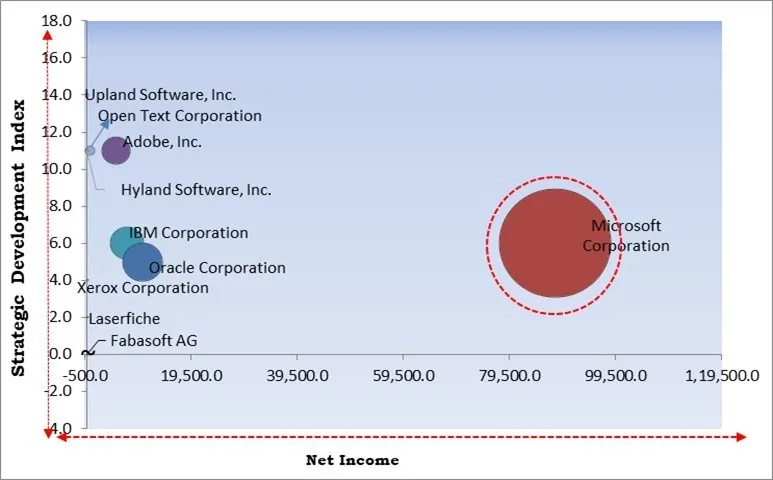
Cloud ECM solutions provide robust security measures, including encryption, multi-factor authentication, and regular backups, ensuring that sensitive business information remains protected. These security features are integrated into the ECM platforms of top providers, including Microsoft Azure, AWS, and Google Cloud. Consequently, these platforms are dependable choices for industries with rigorous compliance standards, such as finance and healthcare. Therefore, it is anticipated that the adoption of cloud-based ECM solutions will continue to expand as the digital landscape continues to develop.
ECM systems often come equipped with audit trails and reporting capabilities, allowing organizations to demonstrate compliance during regulatory audits. These systems also help businesses adapt to evolving regulations by offering customizable workflows and automated updates. Hence, as regulatory requirements continue to become more complex, the role of ECM systems in simplifying compliance and reducing risk is becoming increasingly indispensable for modern enterprises.
Integration services also contribute to the high upfront costs. ECM solutions must often be tailored to align with an organization’s existing workflows, requiring specialized expertise to seamlessly customize and integrate the system. The costs of this customization procedure may increase if unforeseen challenges arise during deployment, as it can be both time-consuming and costly. Beyond the initial purchase and setup, hidden costs such as employee training, ongoing maintenance, and periodic software updates can add to the financial burden. These factors make ECM adoption less attractive to smaller organizations, which may opt for more affordable but less robust content management solutions. Hence, these factors may impede the expansion of the market.
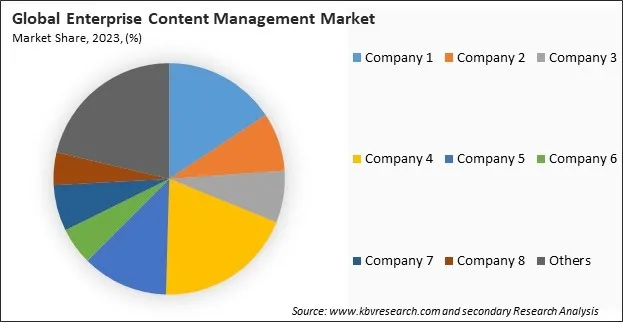
The leading players in the market are competing with diverse innovative offerings to remain competitive in the market. The above illustration shows the percentage of revenue shared by some of the leading companies in the market. The leading players of the market are adopting various strategies in order to cater demand coming from the different industries. The key developmental strategies in the market are Acquisition and Mergers.
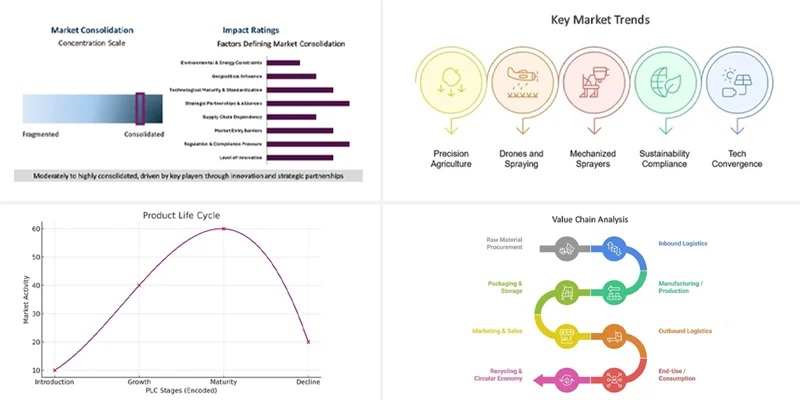

By organization size, the market is divided into large enterprises and small & medium enterprises. The small & medium enterprises segment garnered 33% revenue share in the market in 2023. SMEs are adopting ECM systems to streamline operations, improve document management, and compete in an increasingly digital business landscape. The availability of cost-effective, cloud-based ECM solutions has made these technologies more accessible to smaller organizations, enabling scalability and remote access without significant upfront investments.
Based on deployment type, the market is bifurcated into cloud and on-premise. The cloud segment procured 58% revenue share in the market in 2023. There is an increased demand for systems that enable employees to access and manage content from any location due to the proliferation of remote and hybrid work environments. Cloud ECM platforms are extremely appealing to businesses of all sizes due to their seamless collaboration, automatic updates, and reduced dependence on in-house IT infrastructure.
On the basis of business function, the market is classified into accounts & finance, marketing, supply chain management, human resource, and others. The marketing segment witnessed 29% revenue share in the market in 2023. The marketing segment's growth is fueled by the increasing demand to manage large volumes of digital content across multiple channels. ECM systems enable marketing teams to centralize assets like campaign materials, videos, and social media content, ensuring consistency in branding and messaging. The integration of AI and analytics into ECM platforms has further driven adoption by providing actionable insights into customer behavior, helping marketers optimize campaigns and deliver personalized experiences.
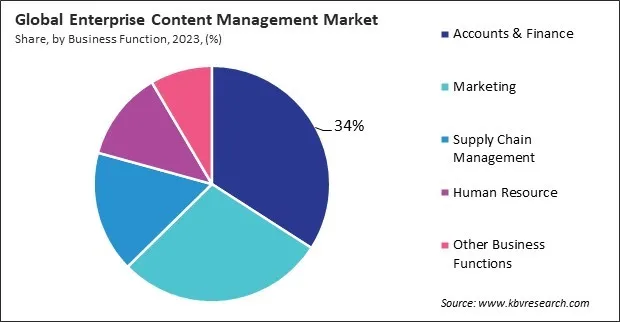
Based on vertical, the market is divided into BFSI, government, energy & utilities, healthcare & lifesciences, education, manufacturing, retail, IT & telecom, and others. The IT & telecom segment witnessed 19% revenue share in the market in 2023. The IT & telecom segment’s growth is propelled by the need to efficiently manage large volumes of operational data and digital content. ECM systems streamline contract management, service documentation, and customer support processes, ensuring consistency across communication channels. The integration of AI and analytics in ECM platforms enables telecom companies to optimize network management, improve predictive maintenance, and enhance customer experiences, addressing the fast-paced and data-driven demands of the sector.
Based on type, the market is bifurcated into solution and services. The solution segment garnered 67% revenue share in the market in 2023. Organizations are adopting advanced ECM platforms to streamline document storage, retrieval, and collaboration, reducing reliance on manual processes. The rising demand for cloud-based ECM solutions further propels this segment, as they offer scalability, cost-efficiency, and remote accessibility, critical in today’s increasingly digital and decentralized work environments. Technological advancements, such as AI and machine learning integration, have made ECM solutions more intelligent and adaptable, attracting businesses across various industries.
By solution type, the market is segmented into records management, web content management, digital asset management, content workflow, mobile content management, and others. The records management segment garnered 31% revenue share in the market in 2023. With the increasing volume of sensitive information, businesses require robust records management solutions to ensure proper storage, retrieval, and retention of records. These systems help organizations mitigate risks related to data breaches, legal disputes, and audit failures. Furthermore, industries such as healthcare, finance, and government, which deal with stringent data management regulations, contribute significantly to adopting records management solutions.
On the basis of services type, the market is classified into professional services and managed services. The professional services segment acquired 63% revenue share in the market in 2023. Businesses increasingly rely on professional services to integrate ECM systems with legacy infrastructure, ensure regulatory compliance, and tailor solutions to meet specific operational needs. The growing adoption of advanced ECM technologies, including AI and cloud-based platforms, further boosts the demand for consulting and training services. Additionally, professional services enable organizations to optimize workflows and maximize the return on their ECM investments, contributing to the segment’s growth.
Free Valuable Insights: Global Enterprise Content Management Market size to reach USD 119.29 Billion by 2031
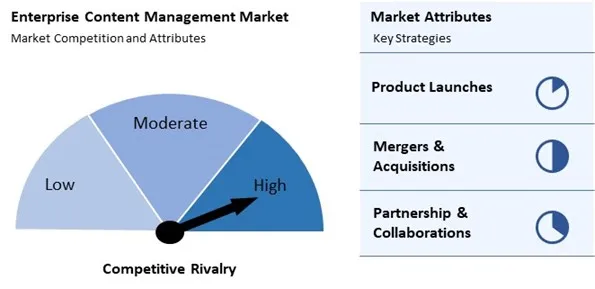
The Enterprise Content Management (ECM) Market is highly competitive, driven by the growing need for efficient data organization, compliance, and workflow automation. Vendors prioritize innovations in cloud-based solutions, AI-powered analytics, and integration with existing enterprise systems. The market is shaped by rising demand for scalable, secure, and user-friendly platforms that enhance collaboration and streamline content lifecycle management. Competition intensifies as businesses increasingly seek solutions to manage unstructured data, ensure regulatory compliance, and improve operational efficiency across diverse industries.
Region-wise, the market is analyzed across North America, Europe, Asia Pacific, and LAMEA. The North America segment acquired 39% revenue share in the market in 2023. Healthcare, finance, and IT have been early adopters of ECM systems to enhance operational efficiency, ensure regulatory compliance, and protect sensitive data. The presence of leading ECM vendors and a strong emphasis on cloud-based and AI-driven solutions further bolsters this region’s growth. Additionally, the increasing focus on remote work and digital transformation initiatives drives continued investment in ECM technologies.
| Report Attribute | Details |
|---|---|
| Market size value in 2023 | USD 38 Billion |
| Market size forecast in 2031 | USD 119.29 Billion |
| Base Year | 2023 |
| Historical Period | 2020 to 2022 |
| Forecast Period | 2024 to 2031 |
| Revenue Growth Rate | CAGR of 16.2% from 2024 to 2031 |
| Number of Pages | 475 |
| Number of Tables | 783 |
| Report coverage | Market Trends, Revenue Estimation and Forecast, Segmentation Analysis, Regional and Country Breakdown, Competitive Landscape, Market Share Analysis, Porter’s 5 Forces Analysis, Company Profiling, Companies Strategic Developments, SWOT Analysis, Winning Imperatives |
| Segments covered | Type, Organization Size, Deployment Type, Business Function, Vertical, Region |
| Country scope |
|
| Companies Included | Adobe, Inc., IBM Corporation, Oracle Corporation, Microsoft Corporation, Open Text Corporation, Xerox Corporation, Hyland Software, Inc., Upland Software, Inc., Laserfiche, Fabasoft AG |
By Type
By Organization Size
By Deployment Type
By Business Function
By Vertical
By Geography
This Market size is expected to reach $119.29 billion by 2031.
Increasing Need for Regulatory Compliance are driving the Market in coming years, however, Substantially High Initial Costs restraints the growth of the Market.
Adobe, Inc., IBM Corporation, Oracle Corporation, Microsoft Corporation, Open Text Corporation, Xerox Corporation, Hyland Software, Inc., Upland Software, Inc., Laserfiche, Fabasoft AG
The expected CAGR of this Market is 16.2% from 2023 to 2031.
The Large Enterprises segment is leading the Market by Organization Size in 2023; thereby, achieving a market value of $77.02 billion by 2031.
The North America region dominated the Market by Region in 2023; thereby, achieving a market value of $44.11 billion by 2031.
Our team of dedicated experts can provide you with attractive expansion opportunities for your business.
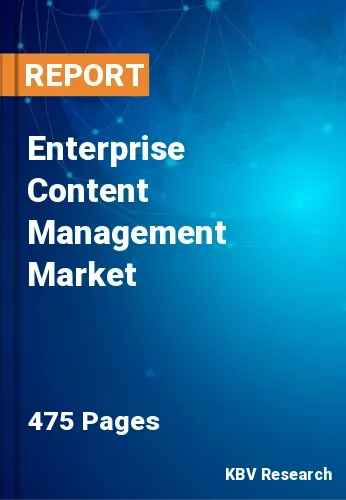
 Drivers
Drivers
 Restraints
Restraints
 Opportunities
Opportunities
 Challenges
Challenges
